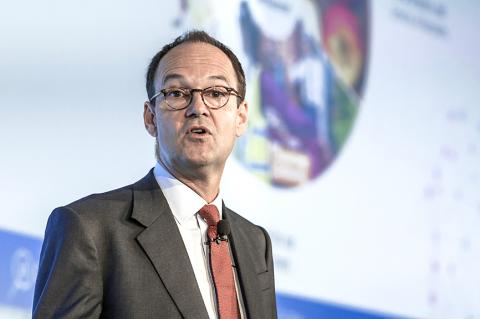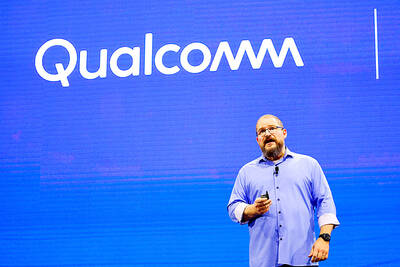Sainsbury’s, Britain’s second-biggest supermarket group, saw its sales growth accelerate in its latest quarter, helped by inflation and a spate of warm weather, though it cautioned trading conditions remained tough.
Sainsbury’s and its major rivals — market leader Tesco, Asda and Morrisons — are grappling with the rapid growth of German discounters Aldi and Lidl, and having to deal with more expensive food imports due to the post-Brexit vote fall in the value of the pound.
“The market is competitive and we continue to manage cost price pressures closely,” chief executive Mike Coupe said.

Photo: Bloomberg
“Our strategy is delivering and we are well placed to navigate the external environment,” he said.
Sainsbury’s said group retail like-for-like sales rose 2.3 percent, excluding fuel, in the 16 weeks to July 1, its fiscal first quarter.
That compares with analysts’ average forecast of a rise of 2 percent and growth of 0.3 percent in the previous quarter.
This was the first quarter following the Home Retail purchase for which the group did not issue separate like-for-like sales data for Sainsbury’s and Argos.
Sainsbury’s said total grocery sales rose 3 percent, while transactions at the supermarket were up 1.9 percent.
General merchandise sales increased 1 percent
The group said online grocery sales increased 8 percent, while sales at convenience stores were up 10 percent.
Prior to yesterday’s update analysts were on average forecasting a pretax profit of £572 million (US$741 million) for 2017 to 2018, down from 581 million in 2016 to 2017. Such an outcome would represent a fourth straight year of profit decline.
Shares of Sainsbury’s, up 5 percent over the past year, closed on Monday at £2.49, valuing the business at 5.5 billion.

Intel Corp yesterday reinforced its determination to strengthen its partnerships with Taiwan’s ecosystem partners including original-electronic-manufacturing (OEM) companies such as Hon Hai Precision Industry Co (鴻海精密) and chipmaker United Microelectronics Corp (UMC, 聯電). “Tonight marks a new beginning. We renew our new partnership with Taiwan ecosystem,” Intel new chief executive officer Tan Lip-bu (陳立武) said at a dinner with representatives from the company’s local partners, celebrating the 40th anniversary of the US chip giant’s presence in Taiwan. Tan took the reins at Intel six weeks ago aiming to reform the chipmaker and revive its past glory. This is the first time Tan

Qualcomm Inc is strengthening its partnerships with Taiwan Semiconductor Manufacturing Co (TSMC, 台積電) and original design manufacturers (ODMs) in Taiwan as it expands its presence in the artificial intelligence (AI) computer market, CEO Cristiano Amon said in Taipei yesterday ahead of the annual Computex trade show. “Historically we’ve always been a very big customer of TSMC, and we continue to be,” Amon said during a media Q&A session. “For chip manufacturing, we’re among the largest fabless [semiconductor designers],” he said, noting that Qualcomm, a leading provider of mobile and AI-enabled chipsets, ships about 40 billion components every year, with TSMC being

‘FAILED EXPORT CONTROLS’: Jensen Huang said that Washington should maximize the speed of AI diffusion, because not doing so would give competitors an advantage Nvidia Corp cofounder and chief executive officer Jensen Huang (黃仁勳) yesterday criticized the US government’s restrictions on exports of artificial intelligence (AI) chips to China, saying that the policy was a failure and would only spur China to accelerate AI development. The export controls gave China the spirit, motivation and government support to accelerate AI development, Huang told reporters at the Computex trade show in Taipei. The competition in China is already intense, given its strong software capabilities, extensive technology ecosystems and work efficiency, he said. “All in all, the export controls were a failure. The facts would suggest it,” he said. “The US

NEW PRODUCTS: MediaTek has been diversifying its product lines to minimize operational risks as mobile chips remain the company’s biggest revenue source MediaTek Inc (聯發科), the world’s biggest supplier of smartphone chips, yesterday said the tape-out process for its first 2-nanometer chip would take place in September, paving the way for volume production of its most advanced chip, likely to be its next-generation flagship smartphone chip, around the year-end at the earliest. MediaTek has been leveraging advanced process technologies from its foundry partner, Taiwan Semiconductor Manufacturing Co (TSMC, 台積電), to build its flagship mobile phone chips, a segment it once relinquished and then recovered four years ago as it released its Dimensity series. In the semiconductor industry, a tape-out refers to the